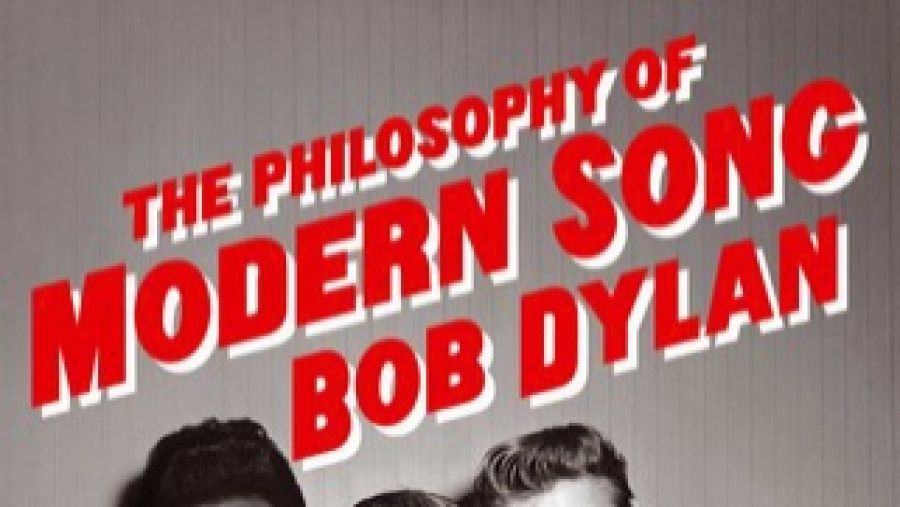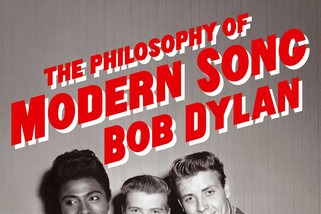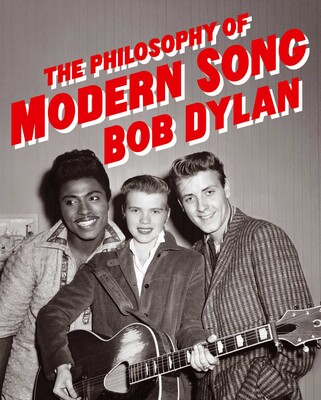
- Free Article: No
- Contents Category: Music
- Review Article: Yes
- Article Title: The song is you
- Article Subtitle: The never predictable Bob Dylan
- Online Only: No
- Custom Highlight Text:
'You got a habit, a bad habit. You fell in love with the hard stuff. You fell for the foxy harlot, the vamp who lives around here somewhere, and you’re silly about her, she’s got you hooked.’
- Featured Image (400px * 250px):

- Alt Tag (Featured Image): Andrew Ford reviews 'The Philosophy of Modern Song' by Bob Dylan
- Book 1 Title: The Philosophy of Modern Song
- Book 1 Biblio: Simon & Schuster, $59.99 hb, 359 pp
- Book 1 Cover Small (400 x 600):

- Book 1 Cover (800 x 1200):

It is a wide canvas, and if Dylan seems more concerned with a song’s lyrics than its music, that is perhaps to be expected. After all, sixty years’ worth of literature about Dylan has tended to do the same. That said, Dylan frequently disarms us with music-al observations, often expressed metaphorically: Bobby Darin’s recording of ‘Mac the Knife’ ‘keeps on modulating till you think it will go through the roof’; with Dean Martin, ‘words dissolve into runs of vowels without the traffic lanes of consonants’; Alvin Youngblood Hart’s guitar turnarounds (on ‘Nelly Was a Lady’) are ‘a slow cakewalk between heartbroken verses’.
Dylan’s connections bring us up short. In the precision of the Temptations – the quintessence of Motown – Dylan hears ‘a link to old-school doo-wop’; the Grateful Dead are ‘essentially a dance band’, having ‘more in common with Artie Shaw and bebop than they do with the Byrds or the Stones’; the Osborne Brothers’ bluegrass is ‘the other side of heavy metal … two forms of music that visually and audibly have not changed in decades’; ‘Blue Moon’ has ‘a melody right out of Debussy’ (not sure about that).
Dylan is also very funny. Writing of Elvis Costello (the song is ‘Pump It Up’), Dylan mentions Elvis’s early resemblance to Buddy Holly, a commonplace observation, but adds that he ‘had Harold Lloyd in his DNA as well’. I doubt that anyone else has made the connection with the bespectacled silent film clown with the boater. Later, commenting on Costello’s versatility and his embrace, alongside rock and roll, of chamber and orchestral music, country and soul, and Burt Bacharach, he adds: ‘When you are writing songs with Burt Bacharach you obviously don’t give a fuck what people think.’
There are diversions. The chapter on ‘Blue Moon’ considers other moon songs; Carl Perkins’s ‘Blue Suede Shoes’ prompts a riff on songs about shoes; the Drifters’ ‘Saturday Night at the Movies’ leads to thumbnail reviews of films such as Ace in the Hole, On the Waterfront, and The Heiress; ‘Don’t Let Me Be Misunderstood’ detours into a discussion about the difficulties of translating the opening line of Camus’s L’Étranger; and Edwin Starr’s ‘War’ leads to one of the longest pieces of writing in the book – on the subject of war, specifically the two Gulf wars of Bush Sr and Bush Jr, via a meditation of ‘the sins of the father’, all culminating in a line that brings ‘Masters of War’ full circle: ‘And if we want to see a war criminal all we have to do is look in the mirror.’
It is kind of Dylan to say ‘we’. Really, he means ‘you’. From the outset, this is a second-person book: ‘In [‘Everybody Cryin’ Mercy’] you’re hemmed in, going round and round the loop, doing full turns … you’re loaded to the rafters, smacking, and slapping at things, buttoned down, no holds barred, going nonstop in a direct line, and everybody’s patting you on the butt.’ ‘In [‘Your Cheatin’ Heart’], you’re the swindler who sold me a faulty bill of goods – beguiled me, double crossed me, and now you’re out of moves and soon you’ll be groaning with prolonged suffering. “How do I know? I just know”’; ‘By the time you get to Phoenix it will be morning where she is, and she’ll be just getting out of bed.’ He doesn’t spell it out, but he’s making it clear nonetheless. These songs are about you. All songs are.
More than half a century has passed since Dylan released Self Portrait, his double album of demo-quality new songs alongside covers of Simon and Garfunkel’s ‘The Boxer’, Gordon Lightfoot’s ‘Early Mornin’ Rain’, the Everly Brothers’ ‘Let It Be Me’ and, yes, ‘Blue Moon’; and Greil Marcus, in his Rolling Stone review, demanded to know ‘What is this shit?’ Since then there have been albums of traditional songs and blues, another of Christmas songs, and a triptych of albums devoted to songs sung by Frank Sinatra.
We should have seen this book coming.


Comments powered by CComment